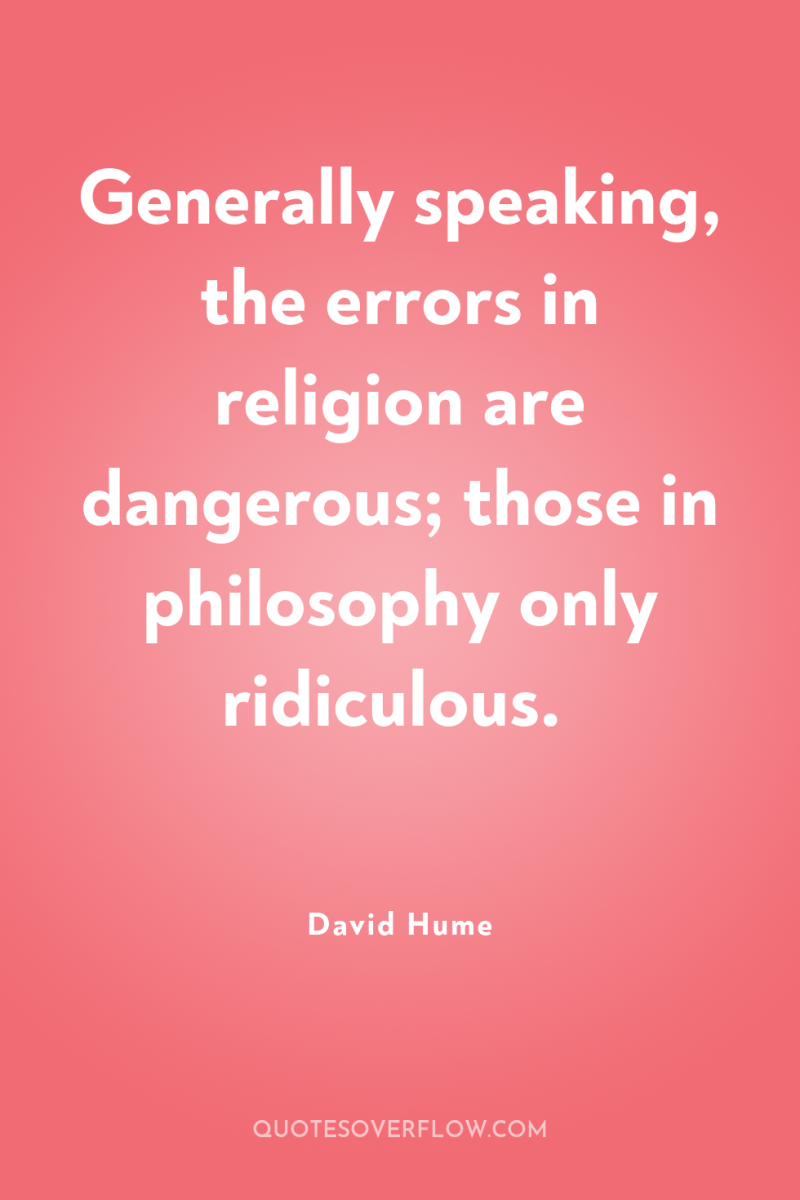
1
Generally speaking, the errors in religion are dangerous; those in philosophy only ridiculous.David Hume
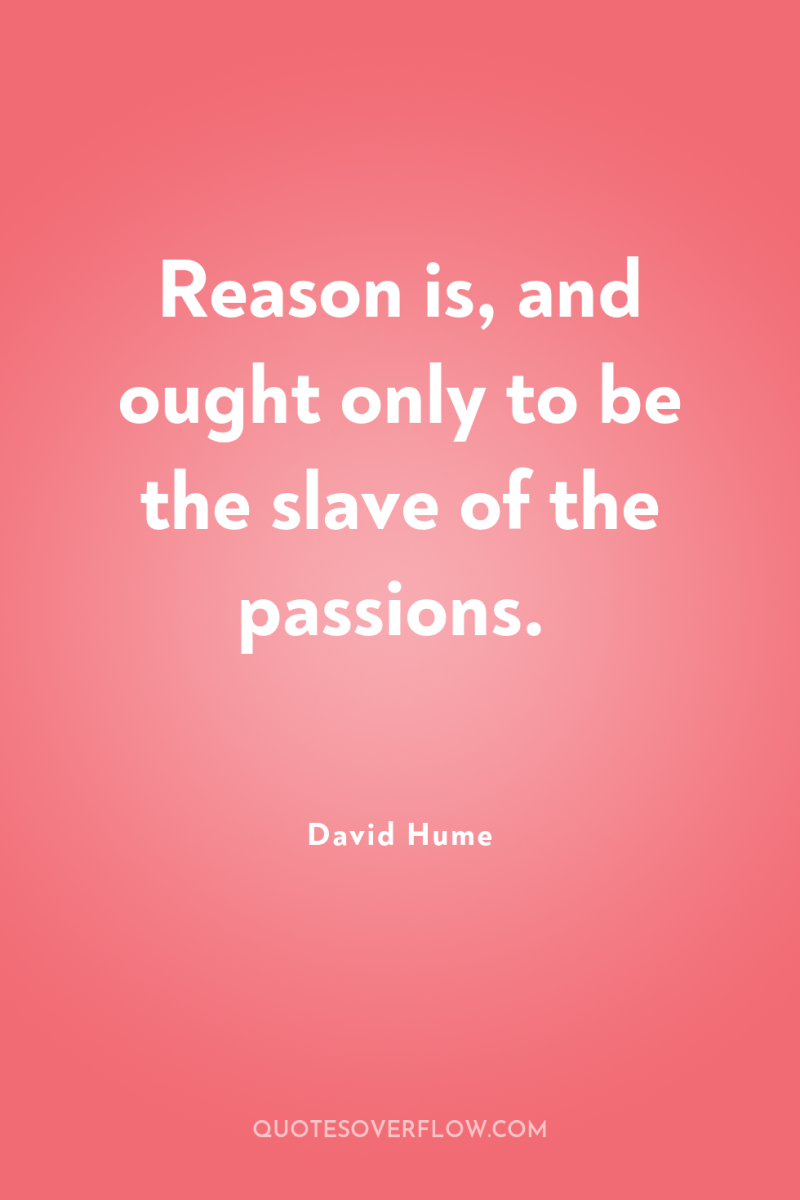
2
Reason is, and ought only to be the slave of the passions.David Hume
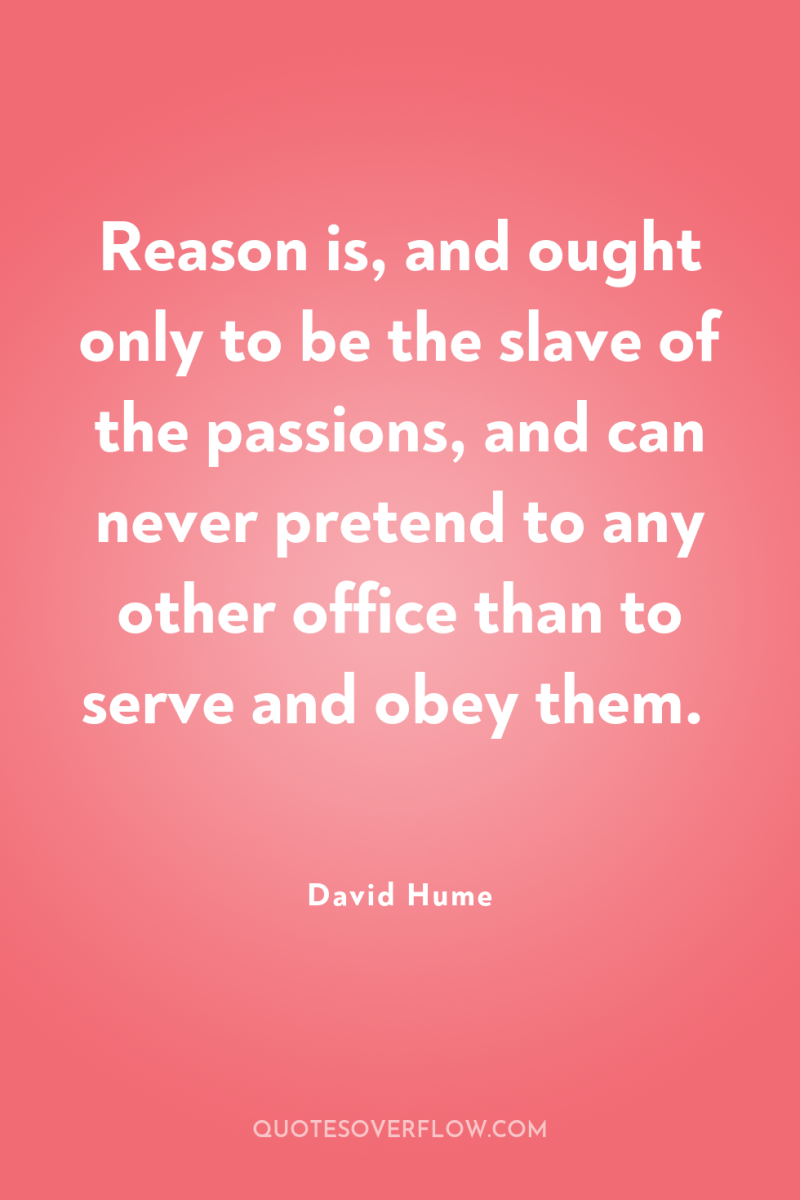
3
Reason is, and ought only to be the slave of the passions, and can never pretend to any other office than to serve and obey them.David Hume
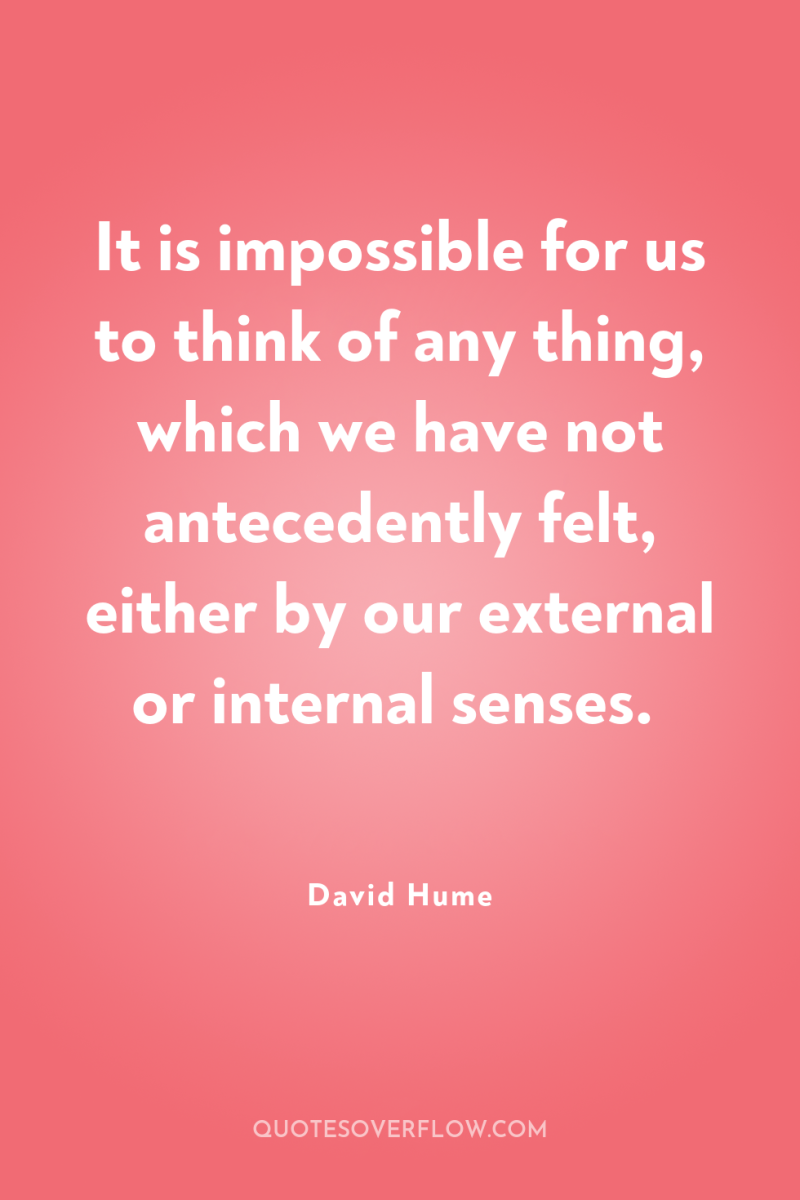
4
It is impossible for us to think of any thing, which we have not antecedently felt, either by our external or internal senses.David Hume
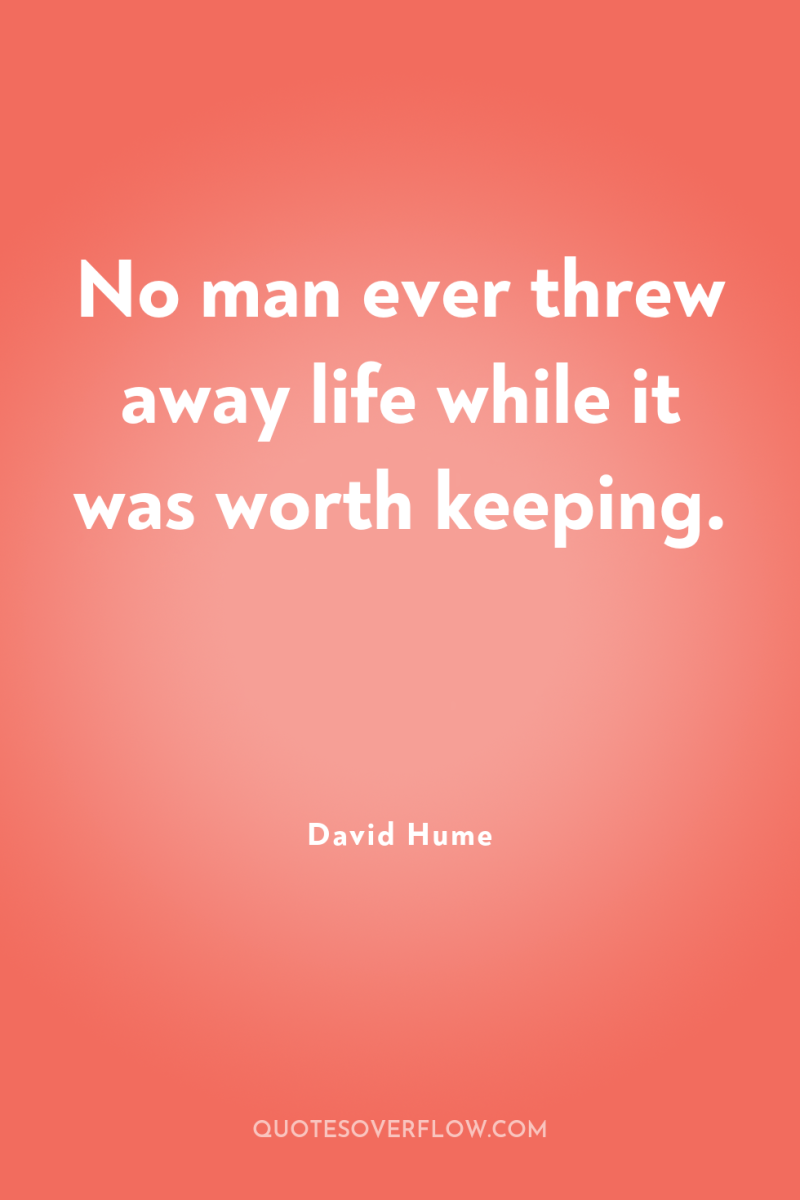
5
No man ever threw away life while it was worth keeping.David Hume
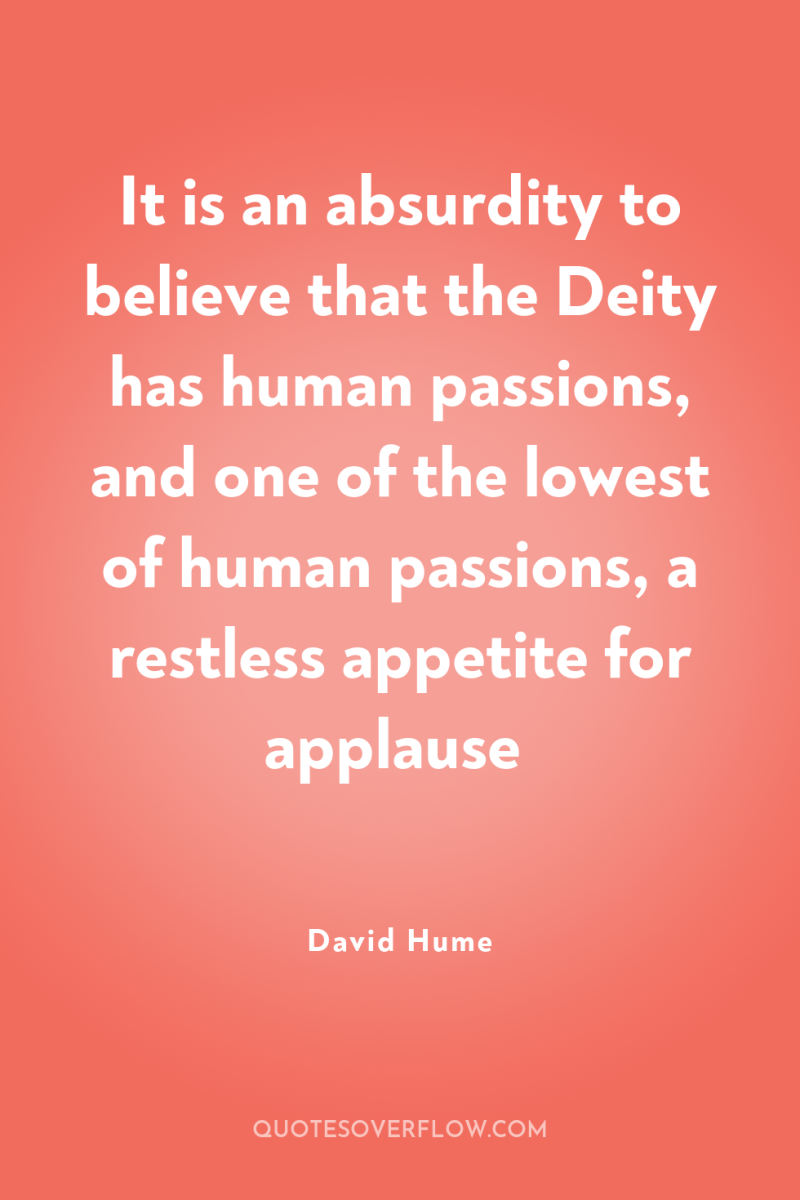
6
It is an absurdity to believe that the Deity has human passions, and one of the lowest of human passions, a restless appetite for applauseDavid Hume
7
When anyone tells me that he saw a dead man restored to life, I immediately consider with myself whether it be more probable that this person should either deceive or be deceived or that the fact which he relates should really have happened. I weigh the one miracle against the other and according to the superiority which I discover, I pronounce my decision. Always I reject the greater miracle. If the falsehood of his testimony would be more miraculous than the event which he relates, then and not till then, can he pretend to command my belief or opinion. .David Hume
8
As every inquiry which regards religion is of the utmost importance, there are two questions in particular which challenge our attention, to wit, that concerning its foundation in reason, and that concerning it origin in human nature.David Hume

9
To be a philosophical Sceptic is the first and most essential step towards being a sound, believing Christian.David Hume
10
Here then we are first to consider a book, presented to us by a barbarous and ignorant people, written in an age when they were still more barbarous, and in all probability long after the facts which it relates, corroborated by no concurring testimony, and resembling those fabulous accounts, which every nation gives of its origin.David Hume
11
How can we satisfy ourselves without going on in infinitum? And, after all, what satisfaction is there in that infinite progression? Let us remember the story of the Indian philosopher and his elephant. It was never more applicable than to the present subject. If the material world rests upon a similar ideal world, this ideal world must rest upon some other; and so on, without end. It were better, therefore, never to look beyond the present material world. .David Hume
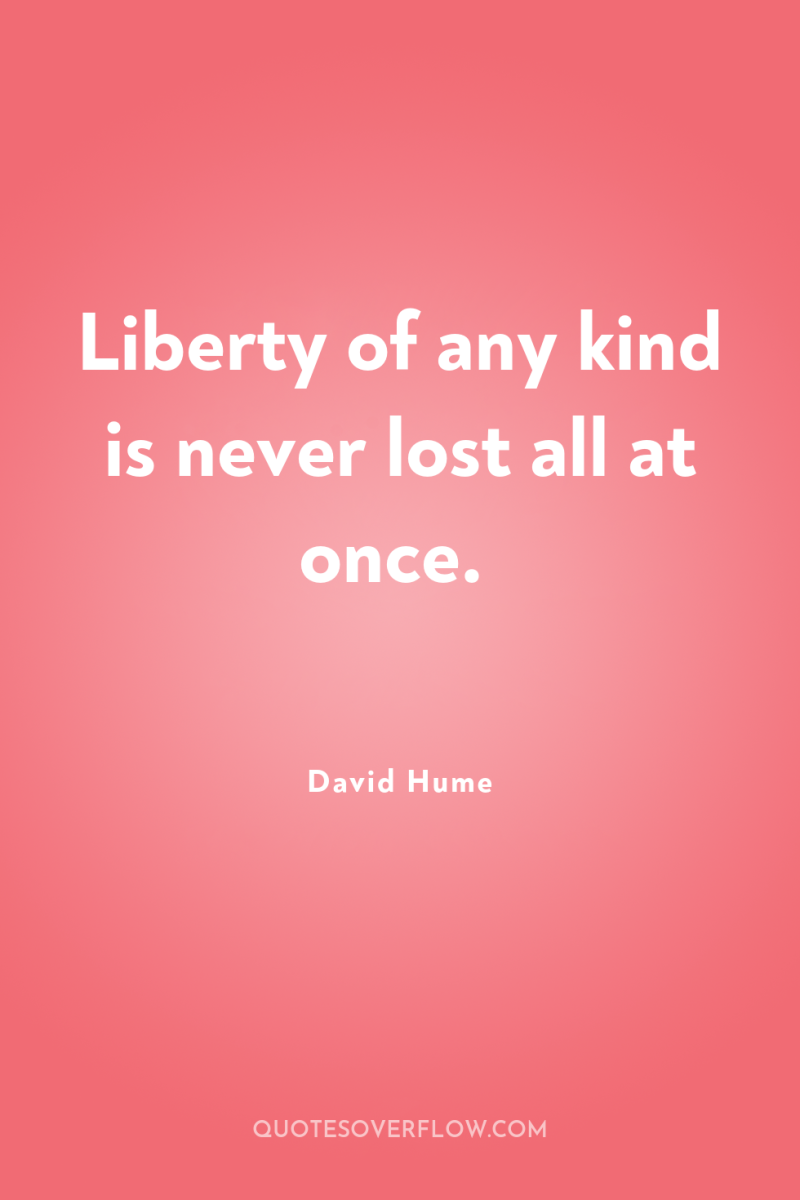
12
Liberty of any kind is never lost all at once.David Hume
13
I am apt, however, to entertain a Suspicion, that the World is still too young to fix any general stable Truths in Politics, which will remain true to the latest Posterity. We have not as yet had Experience of above three thousand Years; so that not only the Art of Reasoning is still defective in this Science, as well as in all others, but we even want sufficient Materials, upon which we can reason. 'Tis not sufficiently known, what Degrees of Refinement, either in Virtue or Vice, human Nature is susceptible of; nor what may be expected of Mankind from any great Revolution in their Education, Customs, or Principles.David Hume
14
I began to entertain a suspicion, that no man in this age was sufficiently qualified for such an undertaking; and that whatever any one should advance on that head would, in all probability, be refuted by further experience, and be rejected by posterity. Such mighty revolutions have happened in human affairs, and so many events have arisen contrary to the expectation of the ancients, that they are sufficient to beget the suspicion of still further changes.David Hume
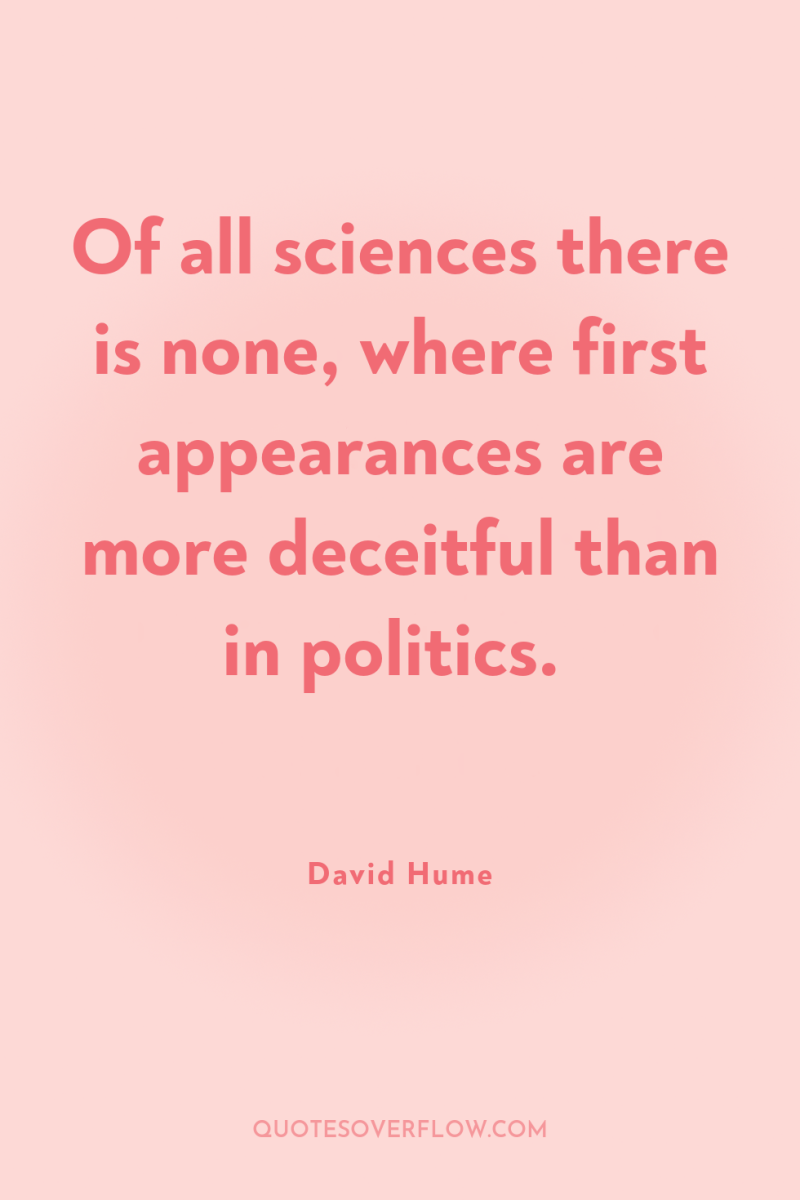
15
Of all sciences there is none, where first appearances are more deceitful than in politics.David Hume
16
Explanation is where the mind rests.David Hume
17
Indulge your passion for science…but let your science be human, and such as may have a direct reference to action and society. Be a philosopher; but amidst all your philosophy, be still a man.David Hume
18
Does a man of sense run after every silly tale of hobgoblins or fairies, and canvass particularly the evidence? I never knew anyone, that examined and deliberated about nonsense who did not believe it before the end of his enquiries.David Hume
19
A man who has cured himself of all ridiculous prepossessions, and is fully, sincerely, and steadily convinced, from experience as well as philosophy, that the difference of fortune makes less difference in happiness than is vulgarly imagined; such a one does not measure out degrees of esteem according to the rent-rolls of his acquaintance. He may, indeed, externally pay a superior deference to the great lord above the vassal; because riches are the most convenient, being the most fixed and determinate, source of distinction. But his internal sentiments are more regulated by the personal characters of men, than by the accidental and capricious favours of fortune.David Hume
20
When suicide is out of fashion we conclude that none but madmen destroy themselves; and all the efforts of courage appear chimerical to dastardly minds .. Nevertheless, how many instances are there, well attested, of men, in every other respect perfectly discreet, who, without remorse, rage, or despair, have quitted life for no other reason than because it was a burden to them, and have died with more composure than they lived? .David Hume
21
If my life be not my own, it were criminal for me to put it in danger, as well as to dispose of it; nor could one man deserve the appellation of hero, whom glory or friendship transports into the greatest dangers, and another merit the reproach of wretch or misereant who puts a period to his life, from the same or like motives.David Hume
22
Nothing is more usual than for philosophers to encroach upon the province of grammarians; and to engage in disputes of words, while they imagine that they are handling controversies of the deepest importance and concern.David Hume
23
Be a philosopher; but, amidst all your philosophy, be still a man.David Hume
24
There are instances, indeed, wherein men shew a vanity in resembling a great man in his countenance, shape, air, or other minute circumstances, that contribute not in any degree to his reputation; but it must be confess’d, that this extends not very far, nor is of any considerable moment in these affections. For this I assign the following reason. We can never have a vanity of resembling in trifles any person, unless he be possess’d of very shining qualities, which give us a respect and veneration for him. These qualities, then, are, properly speaking, the causes of our vanity, by means of their relation to ourselves. Now after what manner are they related to ourselves? They are parts of the person we value, and consequently connected with these trifles; which are also suppos’d to be parts of him. These trifles are connected with the resembling qualities in us; and these qualities in us, being parts, are connected with the whole; and by that means form a chain of several links betwixt ourselves and the shining qualities of the person we resemble. But besides that this multitude of relations must weaken the connexion; ’tis evident the mind, in passing from the shining qualities to the trivial ones, must by that contrast the better perceive the minuteness of the latter, and be in some measure asham’d of the comparison and resemblance. .David Hume
25
Should a traveler, returning from a far country, bring us an account of men wholly different from any with whom we were ever acquainted, men who were entirely divested of avarice, ambition, or revenge, who knew no pleasure but friendship, generosity, and public spirit, we should immediately, from these circumstances, detect the falsehood and prove him a liar with the same certainty as if he had stuffed his narration with stories of centaurs and dragons, miracles and prodigies.David Hume
26
Epicurus's old questions are still unanswered: Is he (God) willing to prevent evil, but not able? then he is impotent. Is he able, but not willing? then he is malevolent. Is he both able and willing? then whence evil?David Hume
27
A miracle is a violation of the laws of nature; and because firm and unalterable experience has established these laws, the case against a miracle is–just because it is a miracle–as complete as any argument from experience can possibly be imagined to be. Why is it more than merely probable that all men must die, that lead cannot when not supported remain suspended in the air, that fire consumes wood and is extinguished by water, unless it is that these events are found agreeable to the laws of nature, and for things to go differently there would have to be a violation of those laws, or in other words a miracle? Nothing is counted as amiracle if it ever happens in the common course of nature. When a man who seems to be in good health suddenly dies, this isn't a miracle; because such a kind of death, though more unusual than any other, has yet often been observedto happen. But a dead man’s coming to life would be a miracle, because that has never been observed in any age or country. So there must be a uniform experience against every miraculous event, because otherwise the event wouldn't count as a ‘miracle’. And as a uniform experience amounts to a proof, we have here a direct and full proof against the existence of any miracle, just because it’s a miracle; andsuch a proof can’t be destroyed or the miracle made credible except by an opposite proof that is even stronger. This clearly leads us to a general maxim that deserves ofour attention: No testimony is sufficient to establish a miracle unless it is of such a kind that its falsehood would be more miraculous than the fact that it tries to establish. And even in that case there is a mutual destruction ofarguments, and the stronger one only gives us an assurance suitable to the force that remains to it after the force needed to cancel the other has beensubtracted.David Hume
28
Tis from the resemblance of the external actions of animals to those we ourselves perform, that we judge their internal likewise to resemble ours; and the same principle of reasoning, carry'd one step further, will make us conclude that since our internal actions resemble each other, the causes, from which they are deriv'd, must also be resembling. When any hypothesis, therefore, is advanc'd to explain a mental operation, which is common to men and beasts, we must apply the same hypothesis to both.David Hume
29
Any pride or haughtiness, is displeasing to us, merely because it shocks our own pride, and leads us by sympathy into comparison, which causes the disagreeable passion of humility.David Hume
30
We choose our favourite author as we do our friend, from a conformity of humour and disposition. Mirth or passion, sentiment or reflection; whichever of these most predominates in our temper, it gives us a peculiar sympathy with the writer who resembles us.David Hume
31
A body of ten ounces raised in any scale may serve as a proof, that the counterbalancing weight exceeds ten ounces; but can never afford a reason that it exceeds a hundred.David Hume
32
This world, for aught he knows, is very faulty and imperfect, compared to a superior standard; and was only the first rude essay of some infant deity, who afterwards abandoned it, ashamed of his lame performance: it is the work only of some dependent, inferior deity; and is the object of derision to his superiors: it is the production of old age and dotage in some superannuateddeity; and ever since his death, has run on at adventures, from the first impulse and active force which it received from him.David Hume
33
Reason is, and ought only to be the slave of the passions, and can never pretend to any other office than to serve and obey them.…' Tis not contrary to reason to prefer the destruction of the whole world to the scratching of my finger.David Hume
34
There is no method of reasoning more common, and yet none more blameable, than, in philosophical disputes, to endeavour the refutation of any hypothesis, by a pretence of its dangerous consequences to religion and morality. When any opinion leads to absurdities, it is certainly false; but it is not certain that an opinion is false, because it is of danger-ous consequence. Such topics, therefore, ought entirely to be forborne; as serving nothing to the discovery of truth, but only to make the personof an antagonist odious.David Hume
35
[I]t must be owned, that liberty is the perfection of civil society; but still authority must be acknowledged essential to its very existence: and in those contests, which so often take place between the one and the other, the latter may, on that account, challenge the preference. Unless perhaps one may say (and it may be said with some reason) that a circumstance, which is essential to the existence of civil society, must always support itself, and needs be guarded with less jealousy, than one that contributes only to its perfection, which the indolence of men is so apt to neglect, or their ignorance to overlook.David Hume
36
A miracle is a violation of the laws of nature; and as a firm and unalterable experience has established these laws, the proof against a miracle, from the very nature of the fact, is as entire as any argument from experience as can be imagined.David Hume
37
The most perfect happiness, surely, must arise from the contemplation of the most perfect object.David Hume
38
Disputes with men, pertinaciously obstinate in their principles, are, of all others, the most irksome; except, perhaps, those with persons, entirely disingenuous, who really do not believe the opinions they defend, but engage in the controversy, from affectation, from a spirit of opposition, or from a desire of showing wit and ingenuity, superior to the rest of mankind. The same blind adherence to their own arguments is to be expected in both; the same contempt of their antagonists; and the same passionate vehemence, in enforcing sophistry and falsehood. And as reasoning is not the source, whence either disputant derives his tenets; it is in vain to expect, that any logic, which speaks not to the affections, will ever engage him to embrace sounder principles.David Hume
39
If Shakespeare be considered as a MAN born in a rude age and educated in the lowest manner, without any instruction either from the world or from books, he may be regarded as a prodigy; if represented as a POET capable of furnishing a proper entertainment to a refined or intelligent audience, we must abate much of this eulogy. In his compositions, we regret that many irregularities, and even absurdities, should so frequently disfigure the animated and passionated scenes intermixed with them; and, at the same time, we perhaps admire the more those beauties on account of their being surrounded by such deformities. A striking peculiarity of sentiment, adapted to a single character, he frequently hits, as it were, by inspiration; but a reasonable propriety of thought he cannot for any time uphold. Nervous and picturesque expressions as well as descriptions abound in him; but it is in vain we look either for purity or simplicity of diction. His total ignorance of all theatrical art and conduct, however material a defect, yet, as it affects the spectator rather than the reader, we can more easily excuse than that want of taste which often prevails in his productions, and which gives way only by intervals to the irradiations of genius. [..] And there may even remain a suspicion that we overrate, if possible, the greatness of his genius; in the same manner as bodies often appear more gigantic on account of their being disproportioned and misshapen.David Hume
40
Your corn is ripe today; mine will be so tomorrow. 'Tis profitable for us both, that I should labour with you today, and that you should aid me tomorrow. I have no kindness for you, and know you have as little for me. I will not, therefore, take any pains upon your account; and should I labour with you upon my own account, in expectation of a return, I know I should be disappointed, and that I should in vain depend upon your gratitude. Here then I leave you to labour alone; You treat me in the same manner. The seasons change; and both of us lose our harvests for want of mutual confidence and security.David Hume
41
While Newton seemed to draw off the veil from some of the mysteries of nature, he showed at the same time the imperfections of the mechanical philosophy, so agreeable to the natural vanity and curiosity of men; and thereby restored her ultimate secrets to that obscurity, in which they ever did and ever will remain.David Hume
42
He is happy whose circumstances suit his temper but he is more excellent who can suit his temper to any circumstances.David Hume
43
Nothing is pure and entire of a piece. All advantages are attended with disadvantages. A universal compensation prevails in all conditions of being and existence.David Hume
44
The most unhappy of all men is he who believes himself to be so.David Hume
45
He is happy whose circumstances suit his temper but he is more excellent who suits his temper to any circumstances.David Hume
46
Be a philosopher but amid all your philosophy be still a man.David Hume
47
I am ready to reject all belief and reasoning and can look upon no opinion even as more probable or likely than another.David Hume
48
A propensity to hope and joy is real riches one to fear and sorrow real poverty.David Hume
49
A man acquainted with history may, in some respect, be said to have lived from the beginning of the world, and to have been making continual additions to his stock of knowledge in every century.David Hume
50
Human Nature is the only science of man and yet has been hitherto the most neglected.David Hume
51
Nothing endears so much a friend as sorrow for his death. The pleasure of his company has not so powerful an influence.David Hume
52
Scholastic learning and polemical divinity retarded the growth of all true knowledge.David Hume
53
There is not to be found, in all history, any miracle attested by a sufficient number of men, of such unquestioned good sense, education and learning, as to secure us against all delusion in themselves.David Hume
54
The Christian religion not only was at first attended with miracles, but even at this day cannot be believed by any reasonable person without one.David Hume
55
The corruption of the best things gives rise to the worst.David Hume
56
The heights of popularity and patriotism are still the beaten road to power and tyranny.David Hume
57
Truth springs from argument amongst friends.David Hume
58
Heaven and hell suppose two distinct species of men, the good and the bad. But the greatest part of mankind float betwixt vice and virtue.David Hume
59
A purpose, an intention, a design, strikes everywhere even the careless, the most stupid thinker.David Hume
60
Beauty in things exists in the mind which contemplates them.David Hume
61
Beauty, whether moral or natural, is felt, more properly than perceived.David Hume
62
Belief is nothing but a more vivid, lively, forcible, firm, steady conception of an object, than what the imagination alone is ever able to attain.David Hume
63
Every wise, just, and mild government, by rendering the condition of its subjects easy and secure, will always abound most in people, as well as in commodities and riches.David Hume
64
Men often act knowingly against their interest.David Hume
65
This avidity alone, of acquiring goods and possessions for ourselves and our nearest friends, is insatiable, perpetual, universal, and directly destructive of society.David Hume